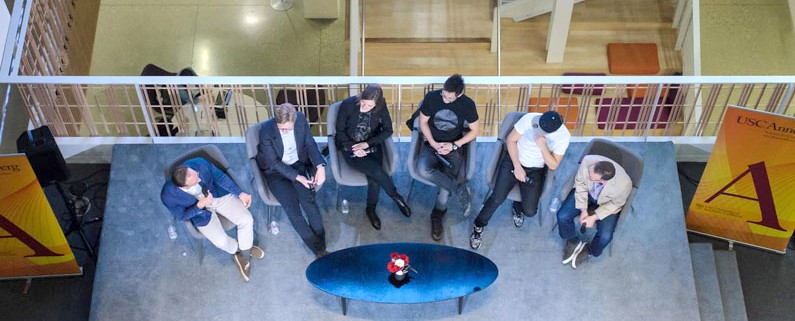YouTube executive Lance Podell speaks to students
Keynote Speaker of the M{2e} program and Global Head of YouTube Spaces, Lance Podell, discussed how YouTube is exponentially growing through his panel, “Four Reasons Why Digital Video Will Win the Decade” in Wallis Annenberg Hall Thursday at noon. The discussion was presented by Clinical Professor of Communication, Christopher Smith.
The Annenberg School for Communication and Journalism’s M{2e}’s events, from Feb. 8-12, focused on media, economics and entrepreneurship to inform students about the importance of digital video.
Gabriel Kahn, professor of professional practice of journalism, and Smith organized this week’s events.
“It has been incredible, and it has really sparked a lot of productive work that we look forward to continuing,” Smith said.
YouTube’s business model changed the industry of digital video, Smith said. He also explained why YouTube speakers were noteworthy to USC’s student body.
“YouTube is right there, with all of the business models that are being experimented with. YouTube transformed what it means to be an influencer, what it means to be a celebrity,” Smith said.
The panel opened with Podell welcoming attendants and encouraging them to be a part of the currently changing media industry.
“All of you are really at the front line of this massive shift,” Podell said. “There is a real need. There is a lot of opportunity for people who can think creatively with a business mind.”
Podell discussed how the mobility of media is helping digital video grow exponentially.
“The youngest millennials are already watching more digital video than television,” Podell said.
Bigger screens, better video clarity and better sound on “phablets” (phone and tablet combination) have revolutionized the industry.
“Digital video is inherently mobile and YouTube is a major driver of this shift,” Podell said.
This diversification has created a large following, especially from millennials. Anyone can make an impact, according to Podell.
“One billion views used to be an outlier,” Podell said. “TV cannot touch one billion views.”
Podell described the new digital experience in the panel.
“Digital video is immersive. It will grow even faster because it can create a much more immersive and interactive experience than TV,” Podell said.
Technologies, like Google Cardboard, a virtual reality headset, have made this immersive experience available to everyone.
“You will have big voices. Please use them. We really think it will make a difference,” Podell said.
Annenberg professors are excited about upcoming opportunities that partnerships, especially with companies such as YouTube can mean for students.
“YouTube cuts across just about every facet of the media landscape,” Kahn said. “So, for our students to get a chance to interact with them on all these different fronts has been like having a peek into the future.”
Students heard from many YouTube executives this week and enjoyed the opportunity.
“I really liked the discussion of the business behind YouTube as a company,” freshman communication major Dani Otter said. “It’s really interesting because it’s a rare situation in which the individual creators have full control over their content yet heavily rely on YouTube as the platform to share and connect with their audience.”
Through Annenberg’s {M2e} program, students are participating in real projects, especially through its partnership with Marshall’s Entrepreneurial Lloyd Greif Center.
“M{2e} is officially on the map of the Annenberg experience,” Smith said. “It is really exciting where we are going to take that in the coming year.”

